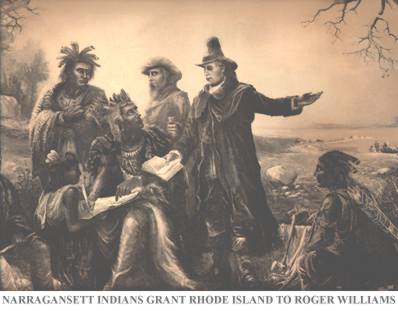
Roger Williams
Champion of Liberty
by Ian Williams Goddard
eighth-great-grandson of Roger Williams
At the unveiling of the statue of Roger Williams at the US Capitol in 1872, Rhode Island Senator William Sprague observed that Roger Williams “successfully vindicated the right of private judgement in matters of conscience, and effected a moral and political revolution in all governments of the civilized world.” [1]
In his crusade for freedom of conscience Williams founded the colony of Rhode Island and Providence Plantations in 1636 as a stronghold of religious liberty after the land was deeded to him by the Narragansett Indians.

A refuge from rampant religious persecution, Rhode Island became home to the first Jewish synagogue in America and a sanctuary for Quakers who were being killed and persecuted in Massachusetts and other colonies. Rhode Island was an open door to all people; a safe harbor in a vast sea of tyranny and oppression; a safe harbor with a bright beacon shining forth the light of liberty, a bright beacon that was Roger Williams.
Before founding Rhode Island, Roger Williams was exiled by law from Salem in the Massachusetts Bay Colony after being repeatedly hauled before the Salem Court of witch-trial fame for spreading "diverse, new, and dangerous opinions" that questioned the Church. The law exiling Williams was not repealed until 1936 when the Massachusetts House passed Bill 488, ending 300 years of exile.
Perhaps most heretical among Roger's many "dangerous opinions" was challenging the King of England's claim to the American colonies with the counter-claim that the rightful owners of the land were the native Americans, not the King of England.
In Defense of Native Americans
Roger Williams tried to persuade his fellow European settlers to respect the land claims of Native Americans and live and trade with them as neighbors, not kill them like vermin. Roger's first book was entitled A Key to The Language of America, which featured a language-translation guide teaching Europeans how to communicate with the Natives — a primary precondition for peaceful association. Unfortunately the majority of Europeans preferred extermination over translation.
Roger's contemporaries argued that Native Americans did not believe in property, and therefore the claims of European settlers violated no preexisting property claims. Roger argued that Native Americans did make property claims and that those claims must be respected. Edwin Gaustad, a professor of history at the University of California, describes the case Williams made for Native land-rights:
The English...justified their grabbing of Indian land by claiming that these simple folk did not really believe in property rights. On the contrary, Williams observed, "the Natives are very exact and punctual in the bounds of their Lands, belonging to this or that Prince or People," even bargaining among themselves for a small piece of ground. [2]
Roger Williams, a Christian minister by training, argued most vigorously against the forced conversion of the Natives to Christianity. Williams believed that forced conversion violated Christian principles and was one of the most "monstrous and most inhumane" acts forced upon the Native peoples of North and South America. Roger called forced conversion "Antichristian conversion" that was like compelling "an unwilling spouse...to enter into a forced bed." Ignoring Roger's appeal to the sanctity of property and individual conscience, European settlers rushed forward to rape not only the Indian's lands but their minds as well.

While most European settlers rejected his vision of peace and harmony between European settlers and Natives, Roger Williams helped to establish an American tradition of religious freedom and individual liberty that has endured to some extent to this very day, encoded in that most sacred document: The Bill of Rights. I could not be more proud of my eighth-great-grandfather, Roger Williams of Rhode Island, an enemy of tyranny and Champion of Liberty!
In closing I offer a quote from Cyclone Covey's book, The Gentle Radical: Roger Williams.
"The most fascinating figure of America's forma- tive seventeenth century," Roger Williams has now gained general acceptance as a symbol of a critical turning point in American thought and institutions. He was the first American to advocate and activate complete freedom of conscience, dissociation of church and state, and genuine political democracy. From his first few weeks in America he openly raised the banner of "rigid Separatism." In one year in Salem he converted the town into a stronghold of radical Separatism and threw the entire Bay Colony into an uproar. Banished for his views, after being declared guilty of "a frontal assault on the foundations of the Bay system," he escaped just as he was to be deported to England.
He settled in Providence with thirteen other householders and in one year formed the first genuine democracy, as well as the first church- divorced and conscience-free community in modern history. Williams felt that government is the natural way provided by God to cope with the corrupt nature of man. But since government could not be trusted to know which religion is true, he considered the best hope for true religion the protection of the freedom of all religion, along with nonreligion, from the state. [3]
[1] Murdock, Myrtle Cheney. National Statuary Hall in the Nation's Capitol. Washington DC: Monumental Press Inc. 1955, p 71.
[2] Gaustad, Edwin S. Liberty of Conscience, Roger Williams in America. Grand Rapids, Michigan: W. B. Eerdmans Publishing, 1991, p 29.
[3] Covey, Cyclone. The Gentle Radical: Roger Williams. New York: The MaCmillian Co., 1966, cover leaf.
© 1997 Ian Williams Goddard
Life member of The Roger Williams Family Association
External Links to Roger Williams Articles
American Memory: Roger Williams
Review of Edwin Gaustad's
Liberty Of Conscience: Roger Williams In America
National Parks: Roger Williams: An American Statesman
An Outline of American Literature
Church History 13: Roger Williams
An Archaeology of Roger Williams (PDF file)
PBS Biography of Roger Williams
Hero of the Day: Roger Williams
Images of Roger Williams
my journal
my home page